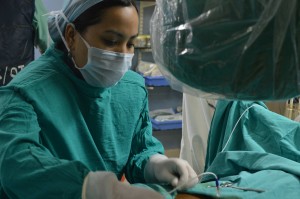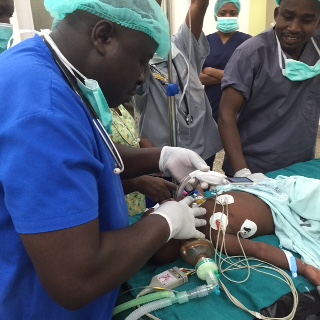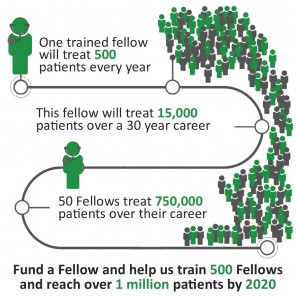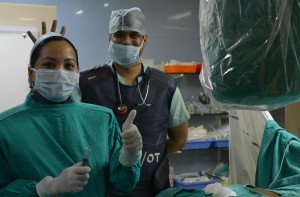Celebrating with the WFSA
Usually it’s parents who brag about their offspring, not the other way around.
But at Lifebox, we’ve always been proud of our roots.
Our co-founder, the World Federation of Societies of Anesthesiologists (WFSA) is an extraordinary organisation: the umbrella body of anaesthesia societies worldwide, it’s a unique collaboration for better standards, education and advocacy across more than 150 countries.
It’s also a staunch and generous supporter of Lifebox. From leading the tender for our pulse oximeter to support for overheads and friendly faces across the continents, we’re grateful for their help.
Recently the WFSA received charitable status in the UK – an exciting opportunity to expand education opportunities for members from some of the most challenging countries in the world to deliver anaesthsia.
Lifebox and the WFSA share a fundamental commitment to education, and its role ensuring the most unshowy, intangible and all too often unsung responsibility of anesthesia providers worldwide: safety.
So while the launch of WFSA (UK) is big news for the Federation, it’s something for all of us to celebrate!
Handing over the mic…
There is still a shortage of more than 1 million specialist surgeons, anaesthesiologists and obstetricians globally, a number set to rise to 2.2 million by 2030 if there is not substantial scale up in surgical care and the vital element of strengthening workforce.
Last year The Lancet Commission on Global Surgery found that more than 5 billion of the world’s 7 billion people do not have access to safe and affordable anaesthesia and surgical care when needed. The impact of these figures on societies and economies is huge and the number one priority in addressing the crisis is meeting the shortfall in skilled anaesthesiologists, surgeons and obstetricians in lower income countries.
In 1996 the WFSA began offering educational fellowships to young anaesthesiologists from low and middle income countries, and twenty years later the programme has successfully trained more than 250 fellows from countries across Africa, Asia, Europe and Latin America.
Each year WFSA fellows receive between 2 and 12 months of training in different specialties in programmes led by regional experts. Fellowships give individual anaesthesiologists the opportunity to access continuing education within their regions, thereby addressing challenges and finding solutions that are specific to their working environment.

However, it is ever more important that we expand our educational offerings in the response to The Lancet Commission’s findings and the large-scale skilled workforce shortage.
To grow our Global Fellowship Programme, the WFSA is asking individuals to “Fund a Fellow” and help train 500 Fellows and reach over 1 million patients by 2020.
Julian Gore-Booth, Chief Executive Officer of WFSA (UK), explained:
“Supported by leading hospitals and dedicated WFSA volunteers, the WFSA is able to offer fellowships to anaesthesiologists from lower income countries at no cost to themselves. But successful applicants can only access these opportunities if their travel and living costs are supported.”
“It is essential that we make these opportunities available to anaesthesiologists who are already working in the countries that need their expertise and leadership the most.”
Dr Ninadini Shrestha from Nepal was awarded the WFSA Pain Management Fellowship in Hyderabad, India last year. Looking back, she remembers one patient in particular, a 70 year old man who was brought in suffering from a fracture to the right humerus, who had a big impact on her work.
“He was given a supraclavicular brachial plexus block with catheterization for continuous plexus anaesthesia,” Dr Shrestha explained. “The relief was immediate and he called his wife ‘Jaanu’ literally meaning ‘my life’ as soon as he saw her. And she just smiled.”
“That was the moment that I became passionate about pain management. That was the moment that taught me that we cannot control or cure disease, but we can decrease the suffering and improve the quality of life by doing pain management.”
Since returning to her hospital in Nepal Dr Shrestha has used her fellowship training to implement changes in pain management.
“There is a tremendous need for me to introduce an organized approach to acute and chronic pain management protocols and assessment tools in our pain management clinic. Designing a database tool that makes our pain cases entry useful for future research and record keeping is my top priority, as it will guide us in our practice,” the young anaesthesiologist explained.
“The WFSA Global Fellowships are an ideal way to learn from the experts and they also cover our financial requirements, a major barrier for people in developing countries,” she added.
As we move into a new era in global health where deaths from non-communicable diseases (NCDs), like cancer or diabetes, are higher than deaths from communicable diseases, like malaria or HIV, new health challenges are becoming increasingly clear. We must invest in scale up now if we are to improve patient care for generations to come.
To donate to the Fund A Fellow campaign, click here, or visit the WFSA page for more information.




